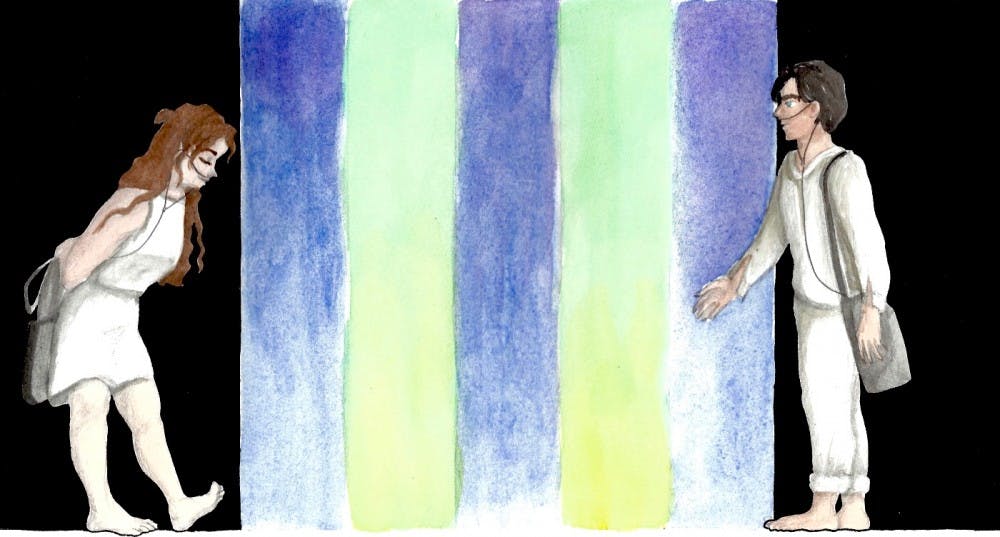Even before its release on March 15, Five Feet Apart was embroiled in controversy. From a misguided influencer campaign to worries about the romanticization of in–patient life, the film has had a rough go of it. These criticisms were amplified by the sheer star power this film held for its teen audience: Haley Lu Richardson of The Edge of Seventeen starred opposite of Cole Sprouse of Riverdale, both under the direction of Justin Baldoni of Jane the Virgin. The movie seems tailor–made for lovestruck young girls and boys, the kind who swoon over teeny–bopper Instagram stars and wield social media as their greatest weapon.
As a result, the film makes it impossible for anyone outside of the target group to forget the fact it wasn’t made for them—at all.
Five Feet Apart follows the story of Stella (Richardson), a young Youtuber with Cystic Fibrosis and OCD, while she receives in–patient treatment in what is probably the world’s nicest hospital (featuring a gym, an atrium, a full dining hall, and much, much more). There, she meets Will (Sprouse), a jaded and joyless misanthrope who grumbles things like: “it’s just life, it’ll be over before you know it” throughout the entirety of the film. Inevitably, the girl with control issues and the boy who could not care less fall hopelessly in love. Literally. Because both patients have CF, they cannot come within six feet of each other for fear of infecting each other’s immune
systems. So they’re fated to be apart. Or are they?

Simply put, the film is emotionally manipulative, sappy, and almost sadistic in the way it uses horny teen virgins who can’t ever kiss each other to say: "life and love are hard. Aren’t you glad it’s a little easier for you?" In fact, at the end of the film, Stella encourages her viewers to “touch” their loved ones if they can, to be in the moment, because life is hard enough without the distance. This sentiment quickly veers into overwrought, angsty pity porn.
Still, some audiences enjoy sappy, digestible, feel–good films—and there’s nothing wrong with that. But, even still, this movie has other problems. There’s the constant visibility of Cole Sprouse’s blond roots, the poorly written and cliche dialogue (featuring both “I want to draw you” and “God, you’re so beautiful”), and really just the attitude of Sprouse’s character in general. Will is the worst kind of guy: a nihilistic pseudo–talented art–boy with rich parents. At one point, he struggles to find something to put on his bucket list besides “sex in the Vatican”, which feels absurd for a character coming to terms with his own death. Everything about him is so terrible that the film's editing genuinely reads as an attempt to cut as many of Will’s scenes as possible, somehow hoping to instead catch other actors' reactions while he delivers his lines somewhere in the background.

Despite its admitted problems, Five Feet Apart is not all bad. As insufferable as Will is, and how stereotypical the sassy black nurse who snaps her fingers feels, the film is partially redeemed because of Baldoni and Richardson. Haley Lu Richardson carried this film on her back. Richardson’s character, Stella, has been dealt a raw deal, and you can feel it in her every glance. She manages to capture the irony of Stella’s situation perfectly: a girl with the compulsive need for control being so unable to control her life beyond her routines and treatments. Every pained smile, every glossy eye, every dissatisfied look in the mirror makes an impact. But without Justin Baldoni’s careful direction, Richardson’s performance may have gotten lost in the shuffle. Though this is Baldoni's first scripted film as a director, his previous work includes My Last Days, which follows a number of different young people (including people with CF) as they live and die. As a result, he brings a delicateness to this movie, dedicated to the truth of disease rather than just the romantic bubbly teen moments set to stylized pop songs.
Because of Baldoni and Richardson, Five Feet Apart might be worth seeing. Yes, it's a little emotionally manipulative, but it also makes a real effort to show the lived experience of people with CF, which isn’t something that we see often. And because the film gives the audience what they want and provides awareness too, the movie earns its right to exist.







